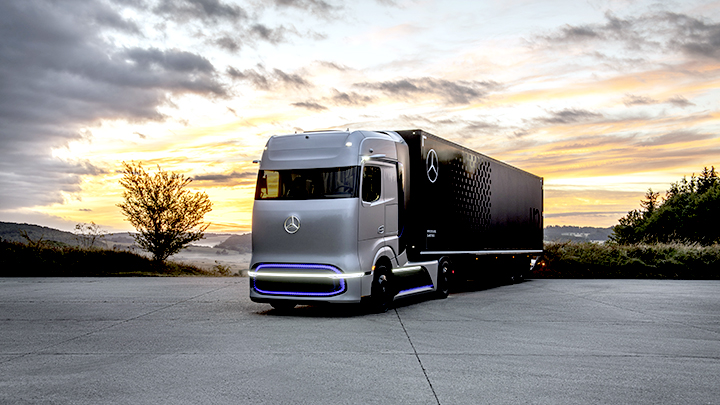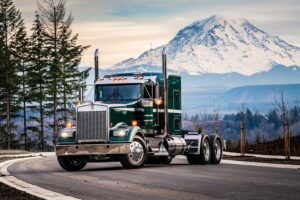STUTTGART/BERLIN, Germany — In mid-September, Daimler Trucks presented the technology strategy for the electrification of its vehicles, ranging from urban distribution to international long-haul transport. The event focused on the technology for hydrogen-based fuel-cell trucks for the long-haul transport segment.
Martin Daum, chairman of the board of management for Daimler Truck AG and member of the board of management for Daimler AG, along with Sven Ennerst, member of the board of management for Daimler Truck AG for development, procurement and the China region, presented the technology strategy at STATION-Berlin. Speakers included Andreas Scheuer, Federal Minister of Transport and Digital Infrastructure.
“Our customers make rational purchasing decisions and are unwilling to compromise on their trucks’ suitability for everyday use, tonnage and range,” Daum stated during the event. “With our alternative drive concepts from Mercedes-Benz — the GenH2 Truck, the eActros LongHaul and the eActros — and our electric trucks of the Freightliner and FUSO brands, we have a clear focus on customer requirements and are creating genuine locally CO2-neutral alternatives for them.”
During the world-premier event, the Mercedes-Benz GenH2 Truck, which marks the beginning of fuel-cell drive, was introduced as a concept vehicle. According to a statement from Daimler Trucks, the manufacturer’s goal is for heavy-duty fuel-cell trucks to perform long-distance haulage operations with ranges of up to 1,000 kilometers (621.371 miles) and more on a single tank of hydrogen. Daimler plans to begin customer trials of the GenH2 Truck in 2023, and series production is to start in the second half of the decade. By using liquid instead of gaseous hydrogen, with its higher energy density, the vehicle’s performance is planned to equal that of a comparable conventional diesel truck.
“We need zero-carbon goods vehicles on our roads. These include hydrogen fuel cell trucks. There is huge potential inherent in hydrogen for the protection of our environment and a strong economy,” Scheuer said. “That is why we have been funding hydrogen as a transport fuel for over 10 years — one current example is the concept truck presented today. We will continue to provide strong support to the development of climate-friendly drivetrains and innovations … this will include, but not be limited to, significantly expanding the funding of vehicles.”
Daimler also previewed a purely battery-powered long-haul truck, the Mercedes-Benz eActros LongHaul, which is designed to cover regular journeys on plannable routes in an energy-efficient manner. The manufacturer plans to have the eActros LongHaul ready for series production in 2024; the truck’s range on one battery charge will be approximately 500 kilometers (310.686 miles). Daimler will start series production of a purely battery-powered heavy-duty truck next year.
Daimler is pursuing similar vehicle schedules for the North American and Japanese markets as it is for Europe. By the year 2022, Daimler Trucks’ portfolio in its main sales regions — Europe, the U.S. and Japan — is to include series-produced vehicles with battery-electric drive. The company has also stated a goal to offer only new vehicles that are CO2-neutral in driving operation (“from tank to wheel”) in Europe, North America and Japan by 2039.
As a new worldwide modular platform architecture, the so-called ePowertrain will be the technological basis of all medium- and heavy-duty CO2-neutral, all-electric series-produced trucks from Daimler, whether powered purely by batteries or by hydrogen-based fuel cells. It will feature high levels of performance, efficiency and durability. With the ePowertrain, Daimler Trucks plans to achieve synergies and economies of scale for all relevant vehicles and markets.
According to a statement from Daimler Trucks, development engineers at Daimler Trucks based the GenH2 Truck on the capabilities of the conventional Mercedes-Benz Actros long-haul truck with regard to tractive power, range and performance. The series-production version of the GenH2 Truck is expected to have a gross vehicle weight of 40 tons and a payload of 25 tons. Two special liquid-hydrogen tanks and a powerful fuel-cell system will make this high payload and long range possible, the manufacturer says.
The statement continues, saying Daimler experts can draw on existing expertise for the development of liquid-hydrogen tanks, and they are also cooperating closely with a partner.
In April, Daimler Truck AG concluded a preliminary, nonbinding agreement with the Volvo Group to establish a new joint venture for the development to series maturity, production and commercialization of fuel-cell systems for use in heavy-duty commercial vehicles and other applications. Joining forces will decrease development costs for both companies and accelerate the market introduction of fuel cell systems. The joint venture is to benefit from the expertise of Daimler Truck AG and the Volvo Group. To facilitate the joint venture with the Volvo Group, Daimler Truck AG merged all group-wide fuel-cell activities into the newly founded subsidiary, Daimler Truck Fuel Cell GmbH & Co. KG.
The Trucker News Staff produces engaging content for not only TheTrucker.com, but also The Trucker Newspaper, which has been serving the trucking industry for more than 30 years. With a focus on drivers, the Trucker News Staff aims to provide relevant, objective content pertaining to the trucking segment of the transportation industry. The Trucker News Staff is based in Little Rock, Arkansas.








